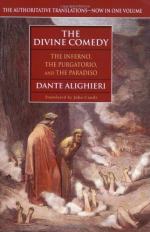The song fulfill’d its measure; and to us
Those saintly lights attended, happier made
At each new minist’ring. Then silence
brake,
Amid th’ accordant sons of Deity,
That luminary, in which the wondrous life
Of the meek man of God was told to me;
And thus it spake: “One ear o’ th’
harvest thresh’d,
And its grain safely stor’d, sweet charity
Invites me with the other to like toil.
“Thou know’st, that in the bosom, whence
the rib
Was ta’en to fashion that fair cheek, whose
taste
All the world pays for, and in that, which pierc’d
By the keen lance, both after and before
Such satisfaction offer’d, as outweighs
Each evil in the scale, whate’er of light
To human nature is allow’d, must all
Have by his virtue been infus’d, who form’d
Both one and other: and thou thence admir’st
In that I told thee, of beatitudes
A second, there is none, to his enclos’d
In the fifth radiance. Open now thine eyes
To what I answer thee; and thou shalt see
Thy deeming and my saying meet in truth,
As centre in the round. That which dies not,
And that which can die, are but each the beam
Of that idea, which our Soverign Sire
Engendereth loving; for that lively light,
Which passeth from his brightness; not disjoin’d
From him, nor from his love triune with them,
Doth, through his bounty, congregate itself,
Mirror’d, as ’t were in new existences,
Itself unalterable and ever one.
“Descending hence unto the lowest powers,
Its energy so sinks, at last it makes
But brief contingencies: for so I name
Things generated, which the heav’nly orbs
Moving, with seed or without seed, produce.
Their wax, and that which molds it, differ much:
And thence with lustre, more or less, it shows
Th’ ideal stamp impress: so that one tree
According to his kind, hath better fruit,
And worse: and, at your birth, ye, mortal men,
Are in your talents various. Were the wax
Molded with nice exactness, and the heav’n
In its disposing influence supreme,
The lustre of the seal should be complete:
But nature renders it imperfect ever,
Resembling thus the artist in her work,
Whose faultering hand is faithless to his skill.
Howe’er, if love itself dispose, and mark
The primal virtue, kindling with bright view,
There all perfection is vouchsafed; and such
The clay was made, accomplish’d with each gift,
That life can teem with; such the burden fill’d
The virgin’s bosom: so that I commend
Thy judgment, that the human nature ne’er
Was or can be, such as in them it was.
“Did I advance no further than this point,
‘How then had he no peer?’ thou might’st
reply.
But, that what now appears not, may appear
Right plainly, ponder, who he was, and what
(When he was bidden ‘Ask’ ), the motive
sway’d
To his requesting. I have spoken thus,




